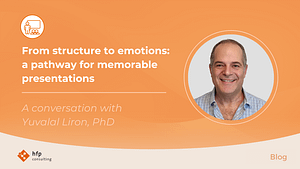
Dana Galili joined hfp as a trainee in 2018. She studied biology and psychology for a B.Sc and then neurobiology for an M.Sc. and a Ph.D. Currently, she works as a postdoctoral scientist in Cambridge, doing research on the neuronal basis of social behaviour in drosophila flies.
Dana, you are currently a trainee trainer at hfp-consulting. At the same time, you are a Cambridge-based fulltime neuroscientist and a mother of two, how do you manage to do that?
My partner and I share childcare responsibilities and support each other’s careers. We seek external help when we need it. That way, I can use my time at home for what really matters to me, being with my children. I try to find the right balance between making good scientific progress, training workshops and maintaining my home and family life. It is often challenging to keep all the balls up in the air, yet I am grateful to have those valuable opportunities in my life.
How old are your kids?
My son is 2 and my daughter is 6.
Which help do you rely upon most? Is there any?
Being far away from our extended families, we mostly rely upon paid help (house cleaning, after-school childcare, babysitting). Occasionally we receive support from friends, and mostly we support each other.
What about your husband – is he a scientist as well? And, is he working full-time, too?
My partner is a scientist, he is a CEO of a life sciences consulting firm. He works full time and more.
Did the two of you ever think about reducing your workload?
Not really. Both of us come from homes with two working parents, so it seemed natural to us to progress our careers while being parents. Coming back to work following maternity leave was challenging for me, however. I was constantly tired and found the transition abrupt. I think this can be tough on many mothers. It gets easier with time.
How many hours a week do you spend in the lab?
Around 40.
… and with your family?
2 hours per day during the week, and the entire weekend. I rarely work on weekends; weekends are dedicated to my family.
… and with other activities?
Not much currently. hfp related activities are currently restricted to enable me to focus primarily on my research. As my children grow, I hope to do more things that I love such as improv theatre.
Who does more with respect to kids and household in general?
My partner and I try to share childcare responsibilities. I still do more, both with the kids and with household, but it is not extreme. For example, we support each other around business trips. The longest for me was being away for 3 weeks on a summer-course, and my partner looked after the household and our daughter during that time.
Are there specific problems with respect to being a mother working in the lab or in a scientific environment in general?
The hours can be tricky. I miss many events that start at 5. I need to carefully plan experiments to fit into my schedule, and sometimes need to stay late in the lab and miss out on seeing my kids.
Childcare is very expensive which becomes a major burden, and a scientist salary/fellowship is barely enough. I find the instability especially challenging; science funding is scarce and time-restricted, and scientists are expected to transition every 1-3 years between contracts, projects, institutes and sometimes countries. Not knowing whether you will have a job in two years’ time is daunting when you have caring responsibilities.
Would you in general see science as a family friendly work environment?
Science ought to be family-friendly,
because it depends on experts. Students mature into scientists, and they raise
families. It’s a loss to science whenever a young researcher drops out because
of that. I think that policies have been improving in recent years, and the
system is becoming more supportive (for example some grant applications take
into account time off for caring responsibilities), but it is still a long way!
The workload of a scientist is demanding, but there is a degree of flexibility;
people may e.g. shift their working hours to enable more family time. Still,
you need to put in the hours; I know only very few scientists who are working less
than full time.
As a trainee, you have been assisting in FLIS (Female leaders in Science) courses primarily in Israel. In how far did your personal experience flow into that?
The course content is written and decided by a highly experienced senior team within hfp. During the workshop, the trainers can tailor the materials to the respective needs of the participants. As a trainee trainer I can provide anecdotes and personal examples to support the delivery of our modules and to validate and reinforce the experiences of our participants.
Speaking of FLIS: what is your impression from talking to participants? Are your personal experiences typical for a female senior scientist in STEM? Is there a typical spectrum of problems?
The experiences are generally similar, especially comparing myself to other mothers. Many feel constantly under time pressure, and have very high expectations of themselves both as scientists and as parents, which can lead to feelings of frustration and guilt when expectations clash.
Did you ever do a FLIS-course yourself? – Or any other hfp course?
I participated in a 3 days leadership course for postdocs.
Was there any impact on your everyday life in the lab, or on your career?
The course changed the everyday way I communicate with colleagues and peers; it gave me simple structures to fit onto complicated processes such as negotiation, conflict resolution, and team dynamics. I became aware of my strengths and weaknesses, and how to manage and benefit from my skills and areas of improvement.
What do you see yourself as in the future with respect to workload, scientist or trainer (in addition to being a mother, of course)?
If both to what extent?
I predict that in any path I will choose in the future, I will have a high workload. This is more personality-driven than career-choice dependant. And in any career path I will choose, I see myself first of all as a parent.





